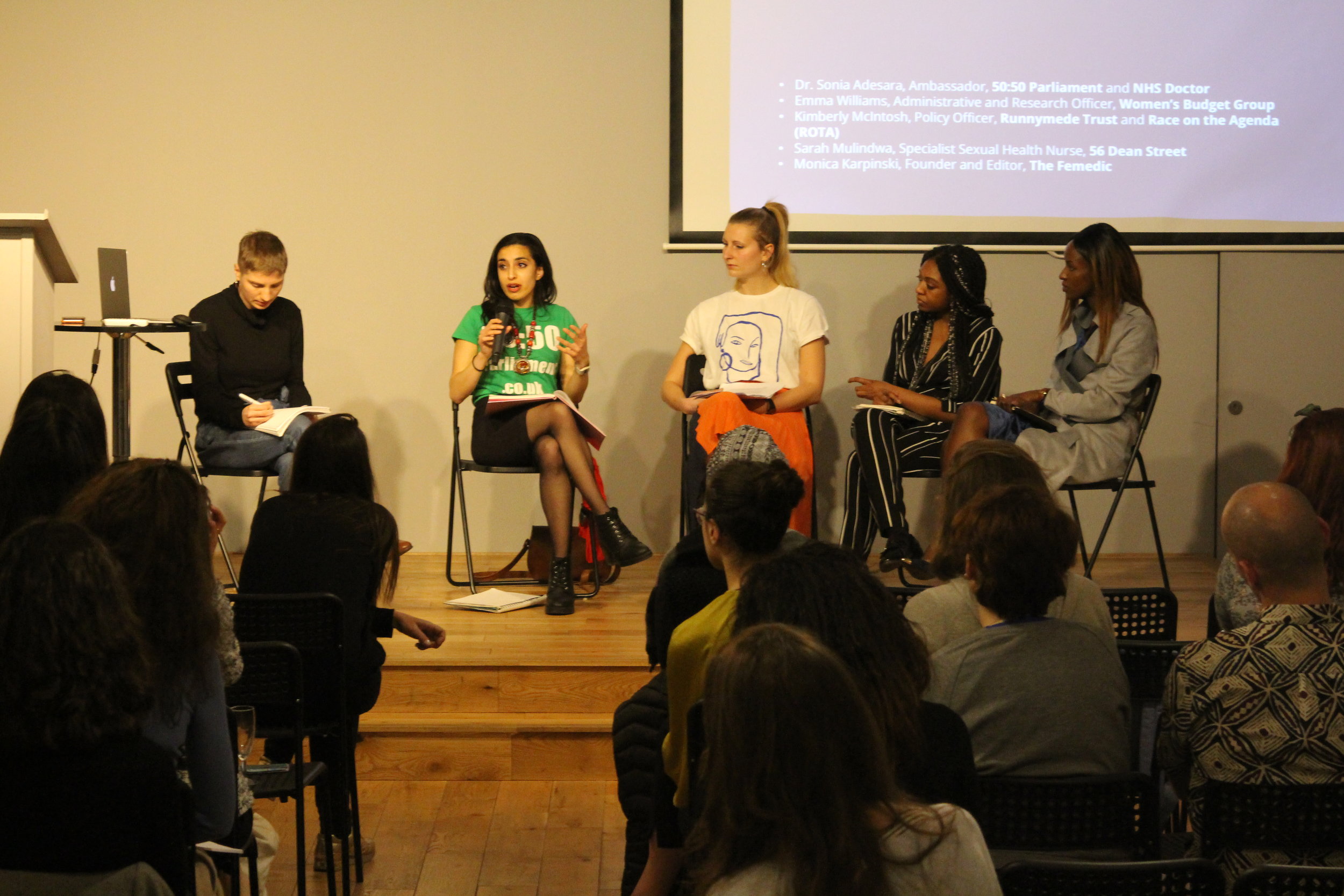
This week at Oh Comely, we've been thinking a lot about women's health and how it's seen in society. The Femedic is a women’s health resource that seeks to empower women by educating them; and they just held an event that focused on the the impact of austerity on women in the UK. Oh Comely sent Gabriella Geisinger to cover it, to see what we can learn.
Women’s health is so often put on the back burner in government policy. It's relegated to the end of the news and is buried in the back pages of the paper. So, you'd expect that the last place people would want to be on a Thursday night is a warm room in London discussing how austerity really effects the lives of women and more specifically, their health.
Hosted by The Femedic, the event titled “How does austerity affect women’s health?” was a panel discussion mediated by The Femedic’s Monica Karpinski, featuring speakers from Women’s Budget Group, Runnymede Trust, 50:50 Parliament, and 56 Dean Street.
So often, we see panels and discussions on women’s issues and the initial excitement is instantly tampered when the names of the speakers are presented – as so many of these discussions are voiced by able-bodied cis white men. At The Femedic’s event, however, we were treated to a diverse and woman-led panel, all of whom were experts in their fields and spoke with confidence and authority.
In thinking about the event, the most interesting fact that lingered was the wide ways in which all manner of austerity cuts negatively impact women’s health. When we think of health and healthcare, the immediate cut we think of is to the NHS, but austerity has a much wider reach than that.
Cuts to the NHS dramatically impact everyone's access to healthcare, but for women, BME women, and disabled women, cuts to other services are equally impactful. As Emma Williams (Administrative and Research Officer, Women’s Budget Group) detailed, things like cuts to public transport can affect the ability for women in rural areas to get to their GP. Cuts to child care and elder care mean that women, who are more likely to be carers, may no longer have time to attend to their health.
Dr Sonia Adesara (Ambassador, 50:50 Parliament, NHS Doctor, Co-Chair, Young Medical Women International Association) explained that part of the government’s inability to act on women’s issues is the imbalance in parliament.
'Until parliament reflects society, it seems it is not just unable but unwilling to act.'
442 of our MPs are men, 208 of our MPs are women. Women are outnumbered by more than 2:1. Of around 800 peers, approximately 200 are women. Women are outnumbered by more than 3:1.
The negative impacts of austerity are that much higher for BME women. Kimberly McIntosh (Policy Officer, Runnymede Trust and Race on the Agenda (ROTA)) described the inequity between white women and women of colour. In 2015-2016 50% of Bangladeshi households, 46% of Pakistani households, 40% of Black African/Caribbean households, and 19% of White households were living in poverty. (Source: Runnymede Trust, The impact of austerity on Black and Minority Ethnic women in the UK, October 2017).
Even as charities rush to fill the gap in care for women, there are still blind spots. Sarah Mulindwa (Specialist Sexual Health Nurse at 56 Dean Street) discussed the clinic which was founded in an attempt to educate and treat gay men in Soho. There has been a dramatic reduction in infection for that targeted population of gay men, however there is no similar clinic for black women, another highly at risk population for HIV. The layers of intellect and experience these five women brought to the stage was not only interesting in an objective way, but also personally.
The discussion hinged on a very particular sticking point. What can we do? Williams brought up the importance for direct action, citing Sisters Uncut’s work. Dr Adesara stressed the need for more diverse women to stand for government. Mcintosh highlighted the importance of holding government to account. Mulindwa sighted grass roots activism and access to health care as a meaningful way of effecting change. And there is more. By virtue of having the talk at all, The Femedic hopes to reduce stigma around these kinds of conversations.
There is a persistent truism within the feminist community – that if feminism isn’t intersectional, it isn’t working. Throughout the panel discussion, disability rights, race, and socio-economic disparity were threaded into the conversation. They grounded it into the reality in which so many people live. But it wasn’t all doom-and-gloom. In fact, the night ended with a rather hopeful tone. That there would be more of these events. That there will be more action, more voices, more women at the forefront of conversations around not just austerity measures, but all policies. If women are expected to bear the brunt of policy impact, you can bet we’re going to talk about it.
Find out more at thefemedic.com
Words and photo by Gabriella M. Geisinger
